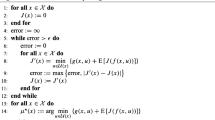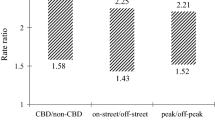Abstract
Recent studies proposed parking reservation schemes in a bi-modal transport network to manage parking competition and traffic congestion. This study proposes a new flexible parking reservation scheme, under which commuters’ reservation can expire and those arriving later than the reservation expiration time can retain his reservation by paying additional late-for-reservation fees. Time-varying late-for-reservation fees are also examined. The proposed reservation scheme is more flexible and practical than those in the literature. Moreover, we found that, when compared to reservation scheme in the literature, the total social cost can be further reduced by an appropriately designed flexible reservation scheme in this paper. We also analytically and numerically quantify the efficiency gain of the proposed flexible parking reservation scheme.











Similar content being viewed by others
Notes
This paper aims to generate analytical insights regarding flexible parking reservation schemes and illustrate the potential efficiency gains from giving flexibility to commuters with a parking reservation. To ease the analysis and avoid tedious algebra, late arrival at the workplace is not considered. Similar treatments can be found in, e.g., Zhang et al. (2008), Xiao et al. (2013), and Liu et al. (2014b).
It is noteworthy that, when mu > 0, in Fig. 3 there exists a time interval \(\left [t_{e}^{u,a}+T_{a}+\frac {\beta }{\alpha }\frac {m^{u}}{s}, t^{*}-\frac {m^{r}}{s}\right ]\) during which the bottleneck service capacity is wasted. Note that \(m<N_{a}^{*}\) (insufficient parking) results in \(t^{*}-\frac {m^{r}}{s}> t_{e}^{u,a}+T_{a}+\frac {\beta }{\alpha }\frac {m^{u}}{s}\), i.e., parking competition due to limited supply forces commuters without reservation to depart much earlier than those with reservation at the bi-modal equilibrium. This capacity waste can still occur even if we introduce more advanced parking reservation schemes later on as long as \(m<N_{a}^{*}\) and mu > 0. However, there should be no capacity waste during the arrival of r-commuters under an efficient reservation scheme (as discussed earlier), i.e., the arrival is continuous between \(t^{*}-\frac {m^{r}}{s}\) and t∗ in Fig. 3.
References
Anderson SP, De Palma A (2004) The economics of pricing parking. J Urban Econ 55(1):1–20
Arnott R, De Palma A, Lindsey R (1990) Economics of a bottleneck. J Urban Econ 27(1):111– 130
Arnott R, De Palma A, Lindsey R (1991) A temporal and spatial equilibrium analysis of commuter parking. J Public Econ 45(3):301–335
Arnott R, Inci E (2006) An integrated model of downtown parking and traffic congestion. J Urban Econ 60(3):418–442
Boyles SD, Tang S, Unnikrishnan A (2015) Parking search equilibrium on a network. Transp Res B Methodol 81:390–409
Chen Z, Spana S, Yin Y, Du Y (2019) An advanced parking navigation system for downtown parking. Netw Spat Econ 19(3):953–968
Chen Z, Xu Z, Zangui M, Yin Y (2016) Analysis of advanced management of curbside parking. Transp Res Rec J Transp Res Board 2567:57–66
Chen Z, Yin Y, He F, Lin JL (2015) Parking reservation for managing downtown curbside parking. Transp Res Rec J Transp Res Board 2498:12–18
Geroliminis N (2015) Cruising-for-parking in congested cities with an mfd representation. Econ Transp 4(3):156–165
He F, Yin Y, Chen Z, Zhou J (2015) Pricing of parking games with atomic players. Transp Res B Methodol 73:1–12
Inci E (2015) A review of the economics of parking. Econ Transp 4(1-2):50–63
Inci E, Lindsey R (2015) Garage and curbside parking competition with search congestion. Reg Sci Urban Econ 54:49–59
Jakob M, Menendez M, Cao J (2020) A dynamic macroscopic parking pricing and decision model. Transportmetrica B: Transport Dynamics 8 (1):307–331
Lam WH, Li Z-C, Huang H-J, Wong SC (2006) Modeling time-dependent travel choice problems in road networks with multiple user classes and multiple parking facilities. Transp Res B Methodol 40(5):368–395
Lei C, Ouyang Y (2017) Dynamic pricing and reservation for intelligent urban parking management. Transp Res C Emerg Technol 77:226–244
Li Z-C, Huang H-J, Lam WH (2012) Modelling heterogeneous drivers’ responses to route guidance and parking information systems in stochastic and time-dependent networks. Transportmetrica 8(2):105–129
Li Z-C, Lam WH, Wong SC, Huang H-J, Zhu D-L (2008) Reliability evaluation for stochastic and time-dependent networks with multiple parking facilities. Netw Spat Econ 8(4):355–381
Liu TL, Huang HJ, Yang H, Zhang X (2009) Continuum modeling of park-and-ride services in a linear monocentric city with deterministic mode choice. Transp Res B Methodol 43(6):692–707
Liu W (2018) An equilibrium analysis of commuter parking in the era of autonomous vehicles. Transp Res C Emerg Technol 92:191–207
Liu W, Geroliminis N (2016) Modeling the morning commute for urban networks with cruising-for-parking: an MFD approach. Transp Res B Methodol 93:470–494
Liu W, Yang H, Yin Y (2014a) Expirable parking reservations for managing morning commute with parking space constraints. Transp Res C Emerg Technol 44:185–201
Liu W, Yang H, Yin Y, Zhang F (2014b) A novel permit scheme for managing parking competition and bottleneck congestion. Transp Res C Emerg Technol 44:265–281
Liu W, Yin Y, Yang H (2015a) Effectiveness of variable speed limits considering commuters’ long-term response. Transp Res B Methodol 81:498–519
Liu W, Zhang F, Yang H (2016) Managing morning commute with parking space constraints in the case of a bi-modal many-to-one network. Transportmetrica Transp Sci 12(2):116–141
Liu Y, Nie YM, Hall J (2015b) A semi-analytical approach for solving the bottleneck model with general user heterogeneity. Transp Res B Methodol 71:56–70
Nie YM (2015) A new tradable credit scheme for the morning commute problem. Netw Spat Econ 15(3):719–741
Qian Z, Rajagopal R (2015) Optimal dynamic pricing for morning commute parking. Transportmetrica Transp Sci 11(4):291–316
Qian ZS, Rajagopal R (2014) Optimal dynamic parking pricing for morning commute considering expected cruising time. Transp Res C Emerg Technol 48:468–490
Qian ZS, Xiao F, Zhang HM (2011) The economics of parking provision for the morning commute. Transp Res A Policy Pract 45(9):861–879
Qian ZS, Xiao F, Zhang HM (2012) Managing morning commute traffic with parking. Transp Res B Methodol 46(7):894–916
Shao C, Yang H, Zhang Y, Ke J (2016) A simple reservation and allocation model of shared parking lots. Transp Res C Emerg Technol 71:303–312
Shoup DC (2006) Cruising for parking. Transp Policy 13(6):479–486
Su Q, Wang DZ (2019) Morning commute problem with supply management considering parking and ride-sourcing. Transp Res C Emerg Technol 105:626–647
Tian Q (2016) The optimal searching strategies of curbside parking with schedule delay penalties. Transportmetrica Transp Sci 12(6):533–549
van den Berg V, Verhoef ET (2011) Congestion tolling in the bottleneck model with heterogeneous values of time. Transp Res B Methodol 45(1):60–78
Vickrey WS (1969) Congestion theory and transport investment. Am Econ Rev 59(2):251–260
Wu W, Zhang F, Liu W, Lodewijks G (2020) Modelling the traffic in a mixed network with autonomous-driving expressways and non-autonomous local streets. Transp Res E Logist Transp Rev 134:101 855
Wu WX, Huang HJ (2014) Equilibrium and modal split in a competitive highway/transit system under different road-use pricing strategies. J Transp Econ Policy (JTEP) 48(1):153–169
Xiao F, Qian ZS, Zhang HM (2013) Managing bottleneck congestion with tradable credits. Transp Res B Methodol 56:1–14
Xiao LL, Liu TL, Huang HJ (2016) On the morning commute problem with carpooling behavior under parking space constraint. Transp Res B Methodol 91:383–407
Xiao LL, Liu TL, Huang HJ (2019) Tradable permit schemes for managing morning commute with carpool under parking space constraint, Transportation, pp 1–24. https://doi.org/10.1007/s11116-019-09982-w
Xu Z, Yin Y, Zha L (2017) Optimal parking provision for ride-sourcing services. Transp Res B Methodol 105:559–578
Yang H, Liu W, Wang X, Zhang X (2013) On the morning commute problem with bottleneck congestion and parking space constraints. Transp Res B Methodol 58:106–118
Zhang F, Lindsey R, Yang H (2016) The Downs–Thomson paradox with imperfect mode substitutes and alternative transit administration regimes. Transp Res B Methodol 86:104–127
Zhang F, Yang H, Liu W (2014) The Downs–Thomson Paradox with responsive transit service. Transp Res A Policy Pract 70:244–263
Zhang X, Liu W, Waller ST (2019a) A network traffic assignment model for autonomous vehicles with parking choices. Comput Aided Civ Infrastruct Eng 34(12):1100–1118
Zhang X, Liu W, Waller ST, Yin Y (2019b) Modelling and managing the integrated morning-evening commuting and parking patterns under the fully autonomous vehicle environment. Transp Res B Methodol 128:380–407
Zhang X, Huang HJ, Zhang HM (2008) Integrated daily commuting patterns and optimal road tolls and parking fees in a linear city. Transp Res B Methodol 42(1):38–56
Zhang X, Yang H, Huang HJ (2011) Improving travel efficiency by parking permits distribution and trading. Transp Res B Methodol 45 (7):1018–1034
Zhang X, Yang H, Huang HJ, Zhang HM (2005) Integrated scheduling of daily work activities and morning–evening commutes with bottleneck congestion. Transp Res A Policy Pract 39(1):41–60
Zheng N, Geroliminis N (2016) Modeling and optimization of multimodal urban networks with limited parking and dynamic pricing. Transp Res B Methodol 83:36–58
Acknowledgements
The authors would like to thank the anonymous referees for their helpful comments. This study was supported by the National Natural Science Foundation of China under Grant No. 61773077, the Research Foundation of Education Bureau of Hunan Province under Grant No. 19A023, the Open Fund of the Key Laboratory of Highway Engineering of the Ministry of Education (Changsha University of Science & Technology) under Grant No. kfj170201, and the China Scholarship Council. Dr. Wei Liu acknowledges the funding support from Australian Research Council (DE200101793).
Author information
Authors and Affiliations
Corresponding author
Additional information
Publisher’s Note
Springer Nature remains neutral with regard to jurisdictional claims in published maps and institutional affiliations.
Rights and permissions
About this article
Cite this article
Wu, W., Liu, W., Zhang, F. et al. A New Flexible Parking Reservation Scheme for the Morning Commute under Limited Parking Supplies. Netw Spat Econ 21, 513–545 (2021). https://doi.org/10.1007/s11067-021-09538-5
Accepted:
Published:
Issue Date:
DOI: https://doi.org/10.1007/s11067-021-09538-5




